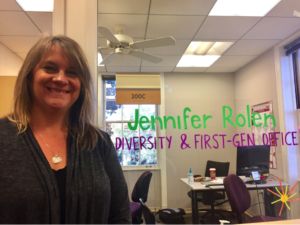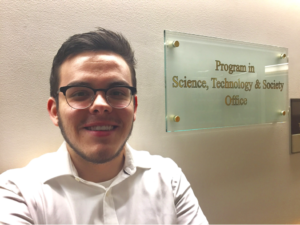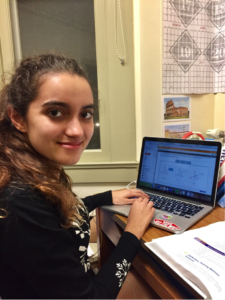For Jennifer Rolen, helping first-generation and low-income students is not just a job — it’s a way to give back to her own community.
For Osvaldo Muro ‘16, deciding on a major was beyond personal interest — his degree was a way to give back to the new life his parents gave to him when they immigrated across the border from Mexico.
And for Stephanie Brito ‘20, the Stanford bubble is more than just a sense of privilege — it is a source of guilt for leaving her working-class family behind.
In the next few months, high school seniors will finalize plans for their first years of adulthood. And the idea of a college education, let alone one from an elite university like Stanford, can seem distant for those who are the first in their family to try.
About one in every six Stanford undergraduates identifies as the first in their family to attend college. Stanford dedicates an entire administrative office of around 20 staff members to support the first-generation and low-income (FLI) community.
President Marc Tessier-Lavigne, who started in that role at Stanford in October, understands the importance of fostering relationships and mentorships in the FLI community. Tessier-Lavigne was the first in his family to attend college when he enrolled at McGill University in 1977.
“I did not have a network of people to help me with the details of college life — how to select classes, how to pick a major, how to make the most of my college experience,” he wrote in an email to The Daily. “Ultimately, a professor at McGill did end up being an important mentor for me, and that illustrated to me the importance of having a support system for students for whom the college experience is particularly new and different.
“I believe it is critical that we provide opportunity for first-generation students and work to support their success.”
Embracing and sharing the first-gen identity after college

Anyone can look through the windows of Jennifer Rolen’s office to see a number of chairs ready to greet visitors — they are set up so she can welcome any student who stops by to seek her mentorship. As the associate dean and associate director of D-Gen, Rolen works alongside several student staff members, who like herself identify as FLI. Her co-workers decorated the window panes with green, yellow and orange letters that read “Jennifer Rolen: Diversity and First-Generation Office” and “We love you!.”
“I am finally doing something I’ve always wanted to do my whole life,” Rolen said. “Being able to work with people who are like me and make change for this population is great.”
Rolen was born to a family with a legacy of working at a car sales business in Sunnyvale. Her mother was a bookkeeper, her uncles were car salesmen and her brother was a car painter.
“It was either work in the car business, like the rest of my family, or do something that thrilled my heart,” Rolen said as she recalled her initial fears of becoming the odd one out in her family.
Rolen described herself as an “average, easily overlooked student.” She attended De Anza Community College, like many of her peers. But before she could complete her two-year degree, in 1989, she left for Hawaii in search of a life outside her town.
In Maui, Rolen worked as a waitress, among various other part-time jobs. But seven years later, at the age of 26, she chose to become a student once again. She returned to De Anza as one of the oldest students in the incoming class of 1996. While juggling her full-time job as an office assistant, she continued her own education in hopes of opening opportunities for others through a career in higher education.
“There I sat in my cultural anthropology class, reading Howard Zinn, gaining knowledge. I wanted to turn everything upside down,” she said. “I found myself. I knew I wanted to be part of something bigger.”
Eager to learn more, Rolen took the next step after De Anza and transferred to San Jose State University in 1999. There, she became interested in researching the way academic content is taught to the underprivileged community. She eventually graduated with a master’s degree in sociology in 2007.
Since then, she has mentored students who, like her, come from a FLI perspective. She started her career as a mentor at the Educational Partnership Center at UC Santa Cruz, where she directed programs to prepare high school students for a college education.
She brought her four years of experience to Stanford in the spring of 2013. From connecting faculty to FLI students through social events like “Food Truck FLI Day” to expanding the Opportunity Fund to support the FLI community’s financial expenses such as emergency trips back home, Rolen has contributed to the expansion of the D-Gen program at Stanford.
“When I was a first-gen, low-income student in college, it wasn’t something I identified with — I just didn’t know. As the [first-generation] identity becomes more salient among the public, more students are asking to be acknowledged, which makes me happy.”
For Arriana Jones ‘19, a sophomore at Stanford and a staff member at the FLI office, Rolen’s background makes her more than an ordinary administrator — she is a role model.
“I think it’s an amazing opportunity to work with someone who was once in our shoes. Knowing someone like her makes me want to help other FLI students even more,” Jones said.
Walking the path from a mentee to a mentor

For Osvaldo Muro ‘16, going to college was not merely a personal decision — it was a decision for his family.
“Everything I did was in the context of my family,” recalled Muro, a Stanford alumnus who graduated from the university with the class of 2016.
Muro comes from a family of blue-collar workers who immigrated from Mexico to the U.S. before he was born. His mom is a seamstress and his dad is a mechanic; both of them have never earned more than minimum wage.
When he arrived at Stanford, he came with ambitions to embrace all that the Cardinal red, flashy catalog had promised during Admit Weekend. But he was also determined to make a better living for his family back home in East Los Angeles.
Determined to help his family financially, Muro started off with a track that seemed most in tune with the STEM world’s demands: Equipped with chemistry and biology courses, he thought he would be ready for a profitable job.
But Muro soon realized that every email list he followed, on-campus event he attended and student organization he joined circled back to education.
“There I was in my education classes, enjoying every moment of it, but always second-guessing myself,” said Muro.
He had to break the news to his family. By the end of his phone call announcing his decision to abandon the biology track for an interdisciplinary major in Science, Technology and Society to become an educator, his mother cried.
“For her, she had failed,” he said. “I wasn’t pushing myself and sacrificing myself for the betterment of my family.”
Still, Muro said he owns up to the decision he made for himself. Now, he works as a high school advisor at the Peninsula Bridge, a non-profit organization in Palo Alto dedicated to supporting first-gen and low-income students with academic resources.
“It’s so important to have people like him who have a similar background,” said Jocelyn Swisher, Osvaldo’s supervisor and the co-executive director of the Peninsula Bridge. “The shared experience between Osvaldo and the students creates a deep connection from the very beginning. He’s a huge asset to the team.”
Since joining the team at Peninsula Bridge, Muro has used his personal experiences to initiate new programs, such as a weekend workshop on social-emotional skill building for FLI students.
“He’s an innovator,” said Swisher. “Based on his experiences, he has brought ideas to us on how to strengthen the program and get to know the students in a deeper way.”
Muro continues to walk the path of a mentor and educator for FLI students in the Bay Area.
“When you’re a first-generation, low-income student with a difficult upbringing, it’s going to take a long time to make Stanford feel like your home,” he said. “I was very fortunate to make it as far as I have, but I had an entire team of people helping me. So I just knew I had to give back.”
Finding community and taking ownership of identity

Stephanie Brito ‘20 finishes her CHEM 31 problem sets before heading out to climb with the alpine club. Over the weekend, she chills with her friends with an episode of “The Office” or two. She thinks she is pre-med but has yet to choose a major.
Sound familiar? Brito appears to be your typical Stanford freshman.
But Brito can’t call home with questions on college life. Instead, she must explain what a “TA” or a “liberal arts education” means to her mother back in Miami. Her parents speak mostly Spanish.
“When she got into college, it was a crazy moment for our family,” said Angelica, Brito’s younger sister. “We knew that all her hard work had paid off and that she earned her spot in all the universities she applied to. ”
Brito takes ownership of this accomplishment by pushing herself to work hard for her education.
“If I fail here, I have nothing to fall back on,” Brito said. “If I want to be successful, it’s on me. Nobody else can do it for me.”
Brito’s education at Stanford is covered thanks to financial aid packages, the welcome grant, the Gates Millennium Scholarship and other financial resources. But that doesn’t mean there are no financial pressures.
“Even though I am fine here financially, the fact that my family may not be is something that troubles me,” Brito said. “When my family told me that they couldn’t send me a $6 package because things were tough, it made me feel bad.”
Brito continues to juggle her responsibilities back home with all the coursework and activities in which she partakes as a Stanford student. Like Rolen and Muro, Brito’s college experience is unique to the FLI community. But like everyone else, Brito creates her own story at Stanford.
“You define your own identity,” said Brito.
Creating a space where first-generation students can define their identity is key, Tessier-Lavigne said.
“It’s important to let students know that we care about their success, that we have a network of people ready to support them, and that they are not alone when they face challenges in adjusting to college.”
Contact Inyoung Choi at ichoi ‘at’ stanford.edu.